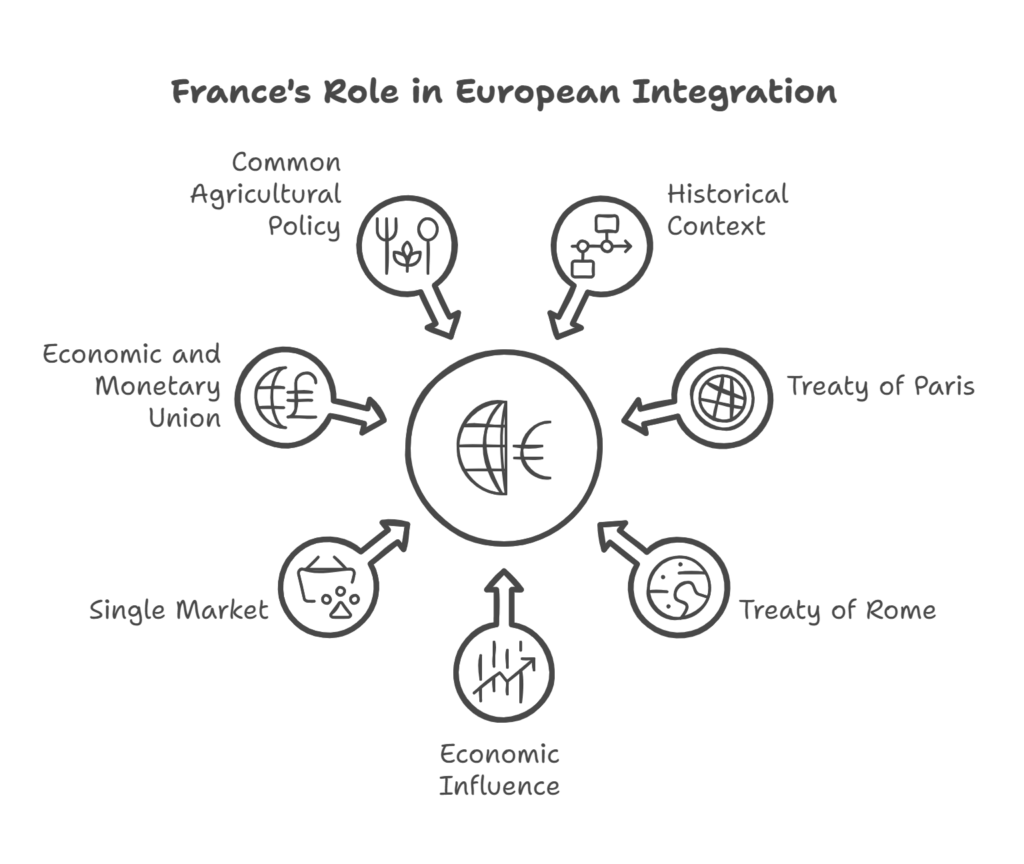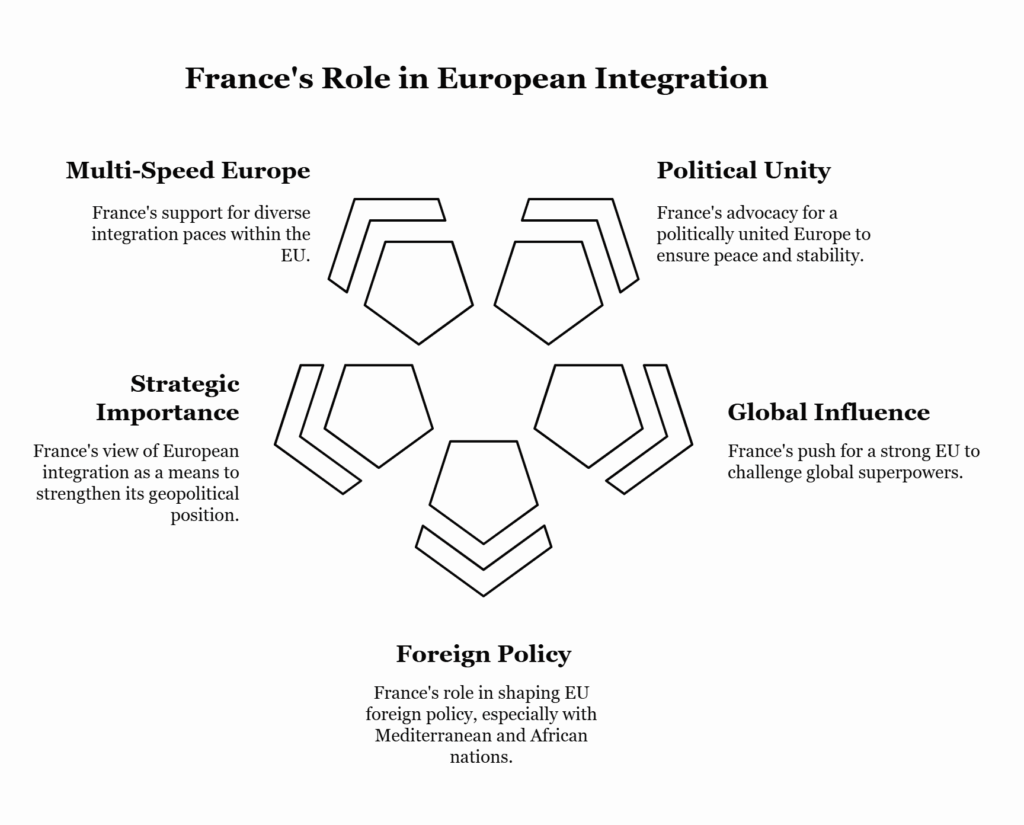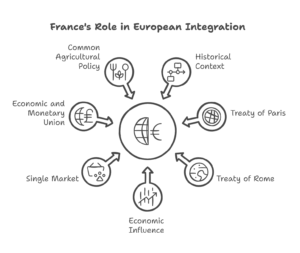France has been a pivotal actor in the process of European integration since the early stages of the European project. As one of the founding members of the European Economic Community (EEC), and later the European Union (EU), France’s political leadership, economic weight, and commitment to multilateralism have shaped the direction and depth of European integration. Its importance can be understood from various dimensions, including historical, political, economic, and strategic factors.
Historical Context and Founding Role
France, alongside Germany, played a critical role in the foundation of European integration after World War II. In the aftermath of the war, European leaders sought ways to prevent future conflicts by fostering cooperation, particularly between France and Germany, whose historic rivalry had led to both world wars. The vision of figures like Jean Monnet and Robert Schuman was to create economic interdependence between European nations as a means to secure peace.
In 1951, France was one of the signatories of the Treaty of Paris, which established the European Coal and Steel Community (ECSC), the first step toward European economic integration. The ECSC aimed to pool coal and steel production, critical materials for warfare, among six founding countries (France, Germany, Italy, and the Benelux countries). This was the beginning of the “European project,” a process that would evolve into the EU.
In 1957, France, along with five other nations, signed the Treaty of Rome, creating the European Economic Community (EEC). This laid the foundation for the common market, and France’s active participation in these formative years ensured its continued influence in shaping the development of European integration.
Economic Influence
France’s economic significance has been a key factor in its central role in European integration. As one of the largest economies in Europe, France has been a major advocate for policies that support economic cohesion within the EU. Its support for the Single Market has helped facilitate the removal of trade barriers and the harmonization of standards across member states.
Moreover, France has played an instrumental role in the creation of the Economic and Monetary Union (EMU) and the adoption of the euro. French leaders, most notably President François Mitterrand, viewed the EMU as both an economic and political tool to ensure European unity and to assert European sovereignty in the global economy. France’s commitment to the euro, alongside Germany, was crucial in ensuring its creation, as both countries provided the political will to push through the Maastricht Treaty in 1992.
France’s economic policy has often influenced broader EU policies, particularly in areas such as agriculture, where the French agricultural sector benefits from the Common Agricultural Policy (CAP), and in the regulation of industries like telecommunications and energy.

Political Leadership and Diplomacy
France has been at the forefront of advocating for a politically united Europe. French leaders have long argued that economic integration alone was insufficient; a political union was necessary to ensure long-term peace, stability, and global influence. This political vision has shaped France’s consistent push for further integration through treaties like Maastricht (1992), Amsterdam (1997), and Lisbon (2007).
France’s position has often emphasized the importance of a strong, cohesive European Union with its own institutions capable of challenging global superpowers like the United States and China. French presidents, from Charles de Gaulle to Emmanuel Macron, have been vocal in their support for a European defense and security policy, emphasizing that a united Europe could better protect its interests on the global stage.
At the same time, France has been a key player in shaping EU foreign policy, particularly in the European Neighborhood Policy and relations with the Mediterranean and Africa. France’s role in the EU’s relations with its southern neighbors, as well as its leadership in the EU Common Foreign and Security Policy (CFSP), reflects its influence in shaping the EU’s external relations.
Strategic Importance
Strategically, France has viewed European integration as a means to strengthen its geopolitical position. Its commitment to a European Security and Defense Policy (ESDP) aligns with its desire to maintain military and strategic autonomy within the EU framework. France’s role in NATO, and its decision to reintegrate into NATO’s military command in 2009, exemplifies its approach to balancing European defense integration with its national interests.
Furthermore, France has been a staunch advocate for a multi-speed Europe, where countries can progress at different paces, rather than enforcing uniformity across all member states. This has been particularly evident in the area of defense and monetary policy, where France has pushed for greater integration while respecting the diversity of national interests within the EU.

Challenges and Criticisms
While France has been a key driver of European integration, its leadership has also faced criticism at times. For instance, Charles de Gaulle’s decision to veto the UK’s entry into the EEC in 1963 and his insistence on national sovereignty sometimes clashed with the vision of a more integrated Europe. The French resistance to deeper integration in certain areas, such as defense and fiscal policies, also highlights the limits of France’s commitment to full political union.
Moreover, France’s economic and political policies, particularly its heavy subsidies to agriculture through the CAP, have occasionally strained relations with other EU countries, particularly in the context of free-market principles.
Conclusion
France’s importance to the integration of Europe is multifaceted and enduring. As a founding member of the European Union, it has been at the heart of the EU’s economic and political evolution. France’s commitment to deeper integration has not only shaped the EU’s structure and policies but also positioned France as a key player in European and global affairs. While challenges remain, France’s influence continues to be a defining factor in the direction of European integration, balancing national interests with the broader goals of European unity and sovereignty.z








Leave a Reply